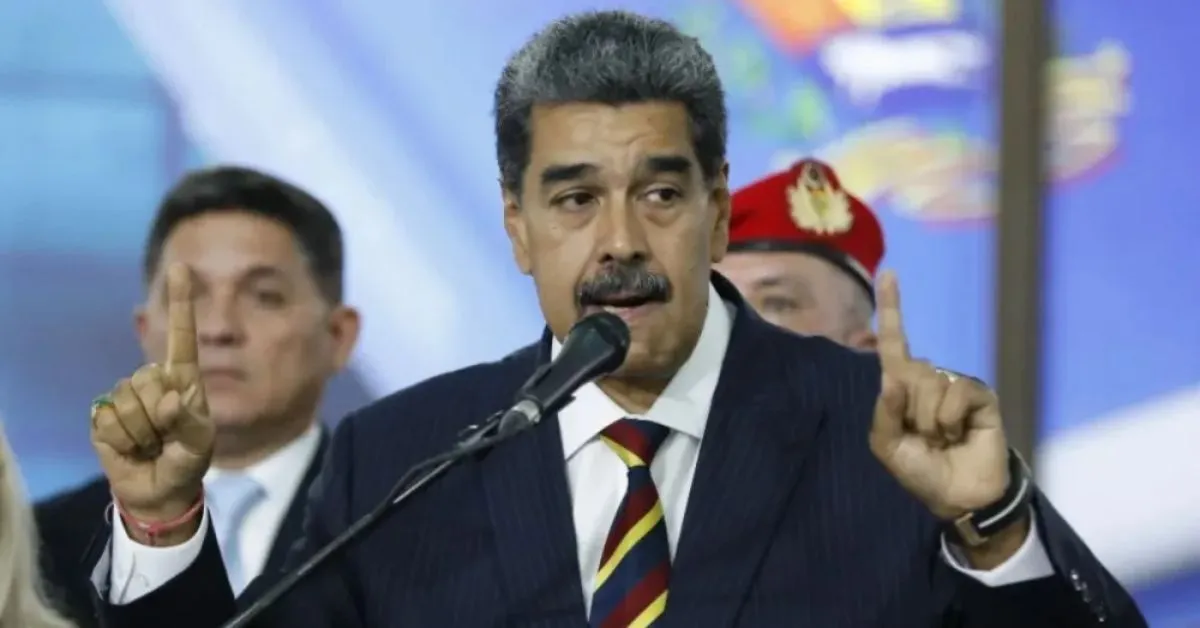
Venezuelan President Nicolas Maduro has demanded that the powers of the State act with an “iron fist” against “hate crimes” which, he says, arose in protests against his questioned re-election, which have left 25 dead and 192 injured.
>>> See more: Blinken and Murillo agree that CNE must reveal electoral records in Venezuela
Maduro was elected with 52% of the votes for a third six-year term. The opposition, led by Maria Corina Machado and her candidate Edmundo Gonzalez Urrutia, denounced fraud and claimed victory in the July 28 elections, which the president has considered an incitement to a “coup d’état” and a “civil war.”
“I demand that all branches of government act with greater speed, greater efficiency and an iron fist against crime, against violence, against hate crimes; an iron fist and severe justice.”Maduro said during a meeting with authorities.
“Where are the masterminds behind this violence? Where are the financiers of this violence? (…) Where is Mr. Edmundo González Urrutia? Why is he fleeing? Why is he afraid? Why won’t he show his face? Where is the biggest fascist, Mrs. Machado, who orders people to kill, who orders people to assassinate?he continued.
González Urrutia, who was nominated to replace the disqualified Machado, last appeared in public almost two weeks ago, while the opposition leader remains in hiding. claiming to fear for his life following a “massive repression” that has left, according to the government, more than 2,200 people arrested.
The protests erupted following opposition allegations of fraud.
The National Electoral Council (CNE), accused of serving Maduro, has so far not published the detailed count of the election, claiming that its system was hacked.
Maduro went to the Supreme Court of Justice (TSJ) to ask to “certify” the election, while the United States, Latin American countries and the European Union (EU) have called for the publication of detailed results.
Did the United States offer amnesty to Nicolás Maduro?
The opposition and the United States are leaving room for mediation by the leftist governments of Brazil, Colombia and Mexico. Washington on Monday denied having offered Maduro amnesty.
US Secretary of State Antony Blinken spoke on Monday with Colombian Foreign Minister Luis Gilberto Murillo to thank him for his “efforts to facilitate a dialogue,” according to State Department spokesman Vedant Patel.
“They discussed the need for electoral authorities in Venezuela to publish transparent results, by voting table”added the spokesman, who stressed that the “region must speak with one voice (…) in order to pressure Venezuela to return to the democratic path.”
The protests left an official death toll of 25 – including two soldiers – and 192 wounded, according to Attorney General Tarek William Saab. The figure coincides with that released by human rights organizations, which reported 24 deaths in a context they denounced as an “escalation of repression.”
Saab blamed the opposition for the deaths, while showing photographs of some of the dead. Most died from gunshot wounds between July 29 and 30.
“The deaths reported in the context of the protests must be thoroughly investigated and, if abusive use of lethal force by security forces and the participation of armed civilians acting with the connivance of said forces is confirmed, those responsible must be held accountable.”said Marta Valiñas, president of the Independent International Mission of the United Nations Human Rights Council in a statement.
Venezuela is unaware of this instance.
The office of the prosecutor of the International Criminal Court (ICC), which has been investigating Venezuela for years over allegations of human rights violations, also announced that it “is actively following current developments and has received numerous reports of violence and other allegations following the elections.”
Nicolas Maduro against social networks
Maduro insists that he is the target of a “cyberfascist coup” while the Parliament, controlled by Chavismo, drives a regulation for social networks.
The initiative is part of a package of laws promoted by Jorge Rodríguez, head of the Legislative Branch, which also includes one to regulate NGOs and another to punish “fascism,” a term the government often uses to refer to its detractors.
“Venezuela needs to regulate the operation of social networks,” said Rodriguez.
Maduro has already suspended social network X for 10 days after accusing its owner, Elon Musk, of inciting hatred and fascism. The deadline is Monday, August 19.
>>> You may be interested in: Maduro’s regime is reportedly marking protesters’ homes in Venezuela with an X
Source: https://www.noticiascaracol.com/mundo/regimen-maduro-exige-mano-dura-por-delitos-de-odio-que-afirmo-surgieron-en-protestas-cb20


